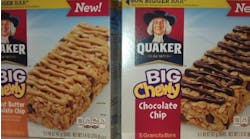As has long been expected, the FDA today (June 16) announced it was revoking the “generally recognized as safe” (GRAS) status of partially hydrogenated oils (PHOs). Food manufacturers will have three years to remove PHOs from products.
While they are wonderfully functional ingredients, PHOs are the primary dietary source of artificial trans fat in processed foods, and trans fat has clearly been linked to heart disease. The FDA decision was "based on a thorough review of the scientific evidence" and comes 19 months after the first warning shot in this issue.
“The FDA’s action on this major source of artificial trans fat demonstrates the agency’s commitment to the heart health of all Americans," said FDA's Acting Commissioner Stephen Ostroff. "This action is expected to reduce coronary heart disease and prevent thousands of fatal heart attacks every year.”
The FDA first announced in November 2013 that it was considering removing GRAS status for PHOs. The agency held a months-long comment period, which was extended into mid-2014. While much of the food industry already has replaced PHOs and trans fats, there remains a significant number of companies that are still wrestling with reformulations. Rumors also indicate Walmart has told its food suppliers to have PHOs removed from products by fall.
During the extra-long comment period, private citizens were 100 percent in favor of a ban. So were comments directly from and forwarded by groups such as Center for Science in the Public Interest.
Public health groups, such as the National Assn. of County and City Health Officials, also supported a ban. So did trade associations and individual vendors who supply alternatives to PHOs. "The U.S. sunflower industry offers immediate solutions to partially hydrogenated (PH) oils," wrote the National Sunflower Assn.
About the same came from the U.S. Canola Assn. And from IOI Loders Croklaan, a supplier of palm oils: "There is no reason to continue to use PHOs in food products, as there already exists in all cases alternative fats and oils which provide similar functionality at similar cost in bakery, snack food and confectionery applications."
But the American Soybean Assn. said removal of GRAS status would result in significant hardship to soybean farmers. It would "decrease U.S. soybean farmer incomes by approximately $1.6 billion per year." Several food processors expressed mild support for a ban as long as it was phased-in over a long period of time.
And FDA apparently has delivered that long phase-in period. The agency set a compliance period of three years. This will allow companies to either reformulate products without PHOs and/or petition the FDA to permit specific uses of PHOs. Following the compliance period, no PHOs can be added to human food unless they are approved by the FDA.
Since 2006, manufacturers have been required to include trans fat content information on the Nutrition Facts label of foods. Between 2003 and 2012, the FDA estimates that consumer trans fat consumption decreased about 78 percent and that the labeling rule and industry reformulation of foods were key factors in informing healthier consumer choices and reducing trans fat in foods. While trans fat intake has significantly decreased, the current intake remains a public health concern. The Institute of Medicine recommends that consumption of trans fat be as low as possible.
The FDA news release can be found here. (http://www.fda.gov/NewsEvents/Newsroom/PressAnnouncements/ucm451237.htm)

